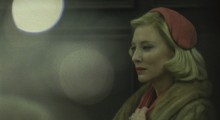Kirsten Johnson
-
“Every Shot Has a Beginning, Middle and End”: Conversations With Cinematographers: The Eye Behind the Lens

Conversations With Cinematographers: The Eye Behind the Lens Jacqueline B. Frost Routledge, 2021 “I’m attracted to edgy things,” explains cinematographer Maryse Alberti in a matter-of-fact response to a question posed by Jacqueline B. Frost in a new collection of 23 interviews titled Conversations With Cinematographers: The Eye Behind the Lens. The statement is part of a longer, quite charming commentary by Alberti, who also recalls her arrival in the US as a 19-year-old au pair with almost no exposure to moving images, early work photographing bands for New York Rocker magazine, and eventually shooting Stephanie Black’s 1990 documentary H-2 Worker, […]
by Holly Willis on Sep 3, 2021 -
“We Think the Audience is Smarter Than Us”: Kirsten Johnson On Making Another Personal and Original Film With “Dick Johnson is Dead”

There are few directorial debuts as sui generis as Kirsten Johnson’s Cameraperson. A kind of experimental documentary, its premise was simple: it collected unused fragments from her long and storied career as a cinematographer, mostly for non-fiction works, among them Citizen Four, Fahrenheit 9/11, The Oath, and more. There was no story, there was no clear mission statement or theme, and the viewer was left to intuit meaning between the fragments arranged seemingly at random. And it was a success, quickly ushered into the Criterion Collection and taking her from a name among non-fiction auteurs to a name auteur herself. […]
by Matt Prigge on Sep 24, 2020 -
Sundance 2020 Dispatch 9: Dick Johnson is Dead, Tesla


I don’t have anything like Six Takeaways From This Year’s Sundance to structure my final dispatch: The most I can offer is my general peer group’s consensus that the fiction side was relatively quiet while nonfiction work was stronger and more attention-getting, including the four-film launch of Concordia Studio. They arrived with, among others, my personal best-of-fest Bloody Nose, Empty Pockets and Time, and ended their first Sundance with the (reported) $12 million sale of verité doc Boys State to Apple and A24. Also high on the nonfiction priorities list, via Netflix, was Kirsten Johnson’s Dick Johnson is Dead, which premiered with the director […]
by Vadim Rizov on Feb 4, 2020 -
“When I Was a Kid, I Thought That Being a Psychiatrist Meant Getting to Sit in the Most Comfortable Chair in the World”: Kirsten Johnson | Dick Johnson is Dead



Whether capturing or creating a world, the objects onscreen tell as much of a story as the people within it. Whether sourced or accidental, insert shot or background detail, what prop or piece of set decoration do you find particularly integral to your film? What story does it tell? Charles and Ray Eames apparently wanted their Eames Lounge Chair and Ottoman to have the “warm receptive look of a well-used first baseman’s mitt.” When I was a child, I simply knew their chair as “Dad’s chair.” He had one of them at his psychiatry office and one at home. Buying […]
by Filmmaker Staff on Jan 25, 2020 -
“If You Really Want To Make Something You Get Creative”: Experimental Documentarians Talk About Thinking Outside The Box At IFP Week 2019

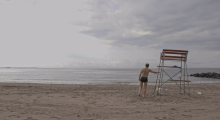
Documentaries don’t have to play by the rules of fiction films. Take a non-fiction hit like Won’t You Be My Neighbor?: It doesn’t merely tell a linear story so much as jump around subjects, with Fred Rogers’ life as a basic foundation. (Compare/contrast with the forthcoming Tom Hanks-starrer A Beautiful Day in the Neighborhood, which zeroes in on one slice of his career.) But some documentaries go way out there. The IFP 2019 panel “Out of Bounds” rounded up four creatives — two filmmakers, one editor, and a producer tasked with helping people like them find funding and distribution — […]
by Matt Prigge on Sep 20, 2019 -
DP Kirsten Johnson on Filming the Kronos Quartet Documentary A Thousand Thoughts

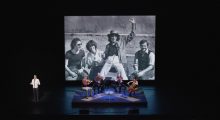
Kirsten Johnson was among the most in-demand documentary DPs even before her much-celebrated 2016 film Cameraperson. Johnson has shot more than 50 films for such directors as Laura Poitras, Alex Gibney and Kirby Dick. Her latest film, A Thousand Thoughts, is a doc on the Kronos Quartet from directors Sam Green and Joe Bini. The film will be presented at Sundance as a “live documentary” with Green narrating live and the Quartet conducting the score in person. Before its premiere, Johnson spoke with Filmmaker about finding innovative ways to film a concert and how a shot from Cameraperson wound up in A […]
by Filmmaker Staff on Jan 21, 2018 -
The Six Fonts of Cameraperson

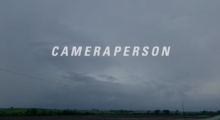
Much has already been written about the piercing human insight of Kirsten Johnson’s Cameraperson. Working with material originally shot for a dozen other films, Johnson refashions the offcuts of her two-decade career as a documentary cinematographer into a patchwork memoir — one that reveals just as much about the woman behind the camera as the individuals who pass fleetingly before its lens. The effect is emotionally exhilarating, but the approach is unabashedly formal — and less has been written about the ways in which Johnson fractionates her footage in order to create a film of clear divisions and implicit rules. […]
by Charlie Lyne on Sep 20, 2016 -
Trailer Watch: Kirsten Johnson’s Personal Cameraperson

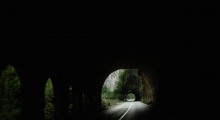
Cameraperson, Kirsten Johnson’s acclaimed personal documentary, has enjoyed a full festival run since its premiere earlier this year at the Sundance Film Festival. The film incorporates Johnson’s cinematography over the past 25 years, including her work on award-winning films such as Fahrenheit 9/11, The Invisible War, and Citizenfour. Now, in advance of its release from Janus Films next month, Cameraperson gets a trailer (above).
by Paula Bernstein on Aug 23, 2016 -
Locking Gaze: Kirsten Johnson on the Images of Her Thrilling Documentary, Cameraperson

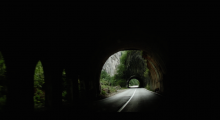
Both memoir and essay film, Kirsten Johnson’s Cameraperson is an astonishing work of cinematic analysis and alchemy. Comprised of material shot by Johnson for 24 different documentaries over a span of 25 years, it’s a movie made up of fragments, globetrotting scenes that tumble one after the other, announced by title cards listing the location and year of the footage but not the director. Included, too, in the footage is personal material, some for film projects of Johnson’s that have yet to be realized and some home movies shot of her mother in the months before she died of Alzheimer’s. […]
by Scott Macaulay on Jul 25, 2016 -
What a Documentary DP Does: Kirsten Johnson on Cameraperson


Documentary DP Kirsten Johnson is probably best known for her work with Laura Poitras (The Oath, Citizenfour), but she’s been shooting for years. Out of her experience comes Cameraperson, an essay film assembled from mostly unused footage shot for many projects. Each segment is labeled by place rather than the project it came from. In eschewing voiceover, the chain of argumentation can be a little heavy-handed for my taste — i.e., cutting from someone talking about death to someone giving birth in a hospital — but the overall effect is constantly surprising and stimulating. The film begins by reminding us that even the […]
by Vadim Rizov on Jan 26, 2016
